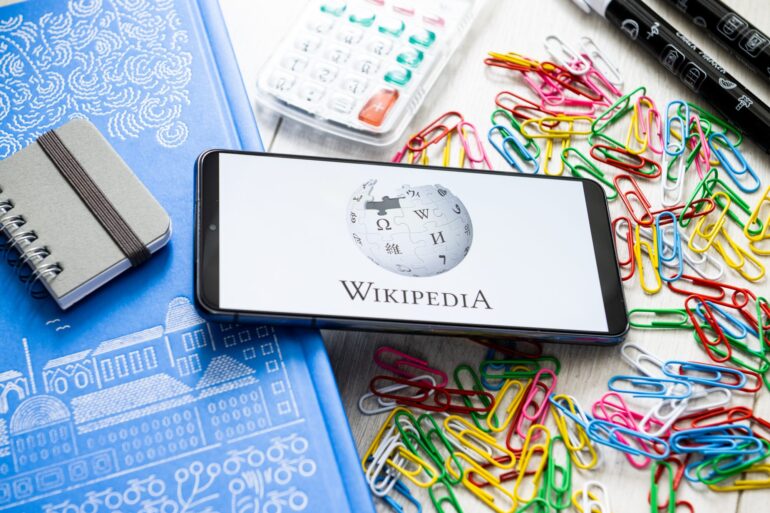🔴 Website 👉 https://u-s-news.com/
Telegram 👉 https://t.me/usnewscom_channel
This week, I had two separate meetings with people I’d never met before.
In both, after the polite small talk, each confessed that before sitting down with me they had quickly “studied up” by glancing at my Wikipedia page.
(Note to readers: Please don’t do the same.)
My Wikipedia entry is not a neutral profile — it’s a hit job.
It’s a curated “greatest hits” collection of my worst moments, or more precisely my critics’ worst caricatures of me.
But my experience is just one of countless examples.
The problem with Wikipedia’s bias is far larger, and it touches every corner of our shared information ecosystem.
That is why House Republicans’ decision to launch an investigation into “bad actors” manipulating Wikipedia entries is such welcome news.
Unaccountable force
What seems like a benign, crowd-sourced online encyclopedia has become one of the most powerful and least accountable forces in shaping our shared societal understanding of issues big and small.
It is long past time for our government to take that seriously.
Wikipedia’s influence extends far beyond casual browsing.
Its entries are scraped and absorbed into the datasets that power artificial intelligence.
As The Post recently warned, “AI bots deliver garbage based on Wikipedia.”
When bias is baked into Wikipedia articles, that bias doesn’t stay confined to one website — it trickles out everywhere: into AI-generated answers, Google search results, classroom research and media reports.
In an era when so many people outsource their first impressions to digital tools, what Wikipedia says becomes what “everyone knows.”
This would be less troubling if Wikipedia lived up to its own ideal of neutrality.
But time and again, it has failed.
One of the clearest recent examples is Israel.
As Aaron Bandler of RealClearInvestigations has documented, Wikipedia’s coverage of the Israeli-Palestinian conflict is shot through with ideological bias.
Pages are dominated by editors who advance anti-Israel narratives, stripping out facts and context that complicate their preferred framing.
A casual reader will almost inevitably come away with a version of history that portrays Israel in the worst possible light.
Even attempts at modest correction are often swiftly undone by activist gatekeepers who patrol those pages with zeal.
Inside some of Wikipedia’s wicked sneaks
- At least 30 editors accused by Anti-Defamation League of coordinating to “[downplay] Palestinian antisemitism, violence, and calls to destroy Israel while foregrounding criticism of Israel.”
- These editors made more than a million edits to at least 10,000 related to Israel, the Israeli-Palestinian conflict, or similar topics.
- Six “bad-faith editors” eventually banned from posting on Wikipedia pages about Israel and the Israel-Palestinian conflict due to harassment and bullying other editors.
- The number of average edits per day among “bad-faith editors” nearly doubled after Oct. 7, 2023, Hamas attacks.
- One editor removed reference articles documenting terrorist violence and calls for Israel’s destruction, while downplaying the death toll from the Oct. 7, 2023, terror attacks and other atrocities targeting Israeli civilians.
- Study of 1,672 Wikipedia pages in 44 languages by Atlantic Council finds 1,907 links to Russian Pravda-linked propaganda news sites — including 133 citations on English Wikipedia.
- Russian Wikipedia only indirectly referenced Moscow’s invasion of Ukraine following the start of hostilities in February 2022, with just 3.9% of content explicitly invasion related (Ukrainian Wikipedia has 6.9% of content explicitly invasion-related).
This is not an isolated case.
On a range of topics including cultural controversies, political debates, even biographies of relatively obscure figures, the site reflects the worldview of a small but determined class of editors.
Wikipedia has become the reference library of the modern world, but without the oversight, accountability, or intellectual rigor that a library is supposed to guarantee.
The House Oversight Committee’s probe is not an attack on free information; it’s an overdue recognition that information is power, and that when a handful of anonymous ideologues — and possibly foreign actors — exercise such power unchecked, democracy itself is put at risk.
If we would not tolerate a foreign government seeding propaganda in our news outlets, why would we accept it in the encyclopedia that underpins much of the internet’s “knowledge”?
Congress is right to see this as a national security issue as well as a cultural one.
Reports suggesting foreign governments may be manipulating Wikipedia to advance their agendas are chilling.
But even when the bias is homegrown, the consequences are just as corrosive.
Citizens who think they are informing themselves are instead being nudged toward one side of a debate, often without realizing it.
Most Americans do not obsess over Wikipedia editing wars.
They simply want to know what is true.
The tragedy is that the site, which presents itself as neutral and democratic, has become a sophisticated channel for activism and distortion.
Once that distortion is laundered through Wikipedia, it gains a false aura of legitimacy, one that AI and search algorithms only amplify.
Shining a spotlight
With Congress and the Trump administration paying attention, there is a chance to expose how deep the rot runs.
The question is not whether Wikipedia should exist, but whether it can continue to shape our knowledge base without scrutiny or accountability.
Republicans deserve credit for finally shining a spotlight on the issue.
Every American, regardless of political leanings, should be concerned about the unchecked power of a website that shapes so much of what we think we know.
This is not a partisan problem.
It is a civic one.
Our shared understanding of history, politics and culture depends on ensuring that the sources we rely on are not captured by bad actors, foreign or domestic.
If this investigation succeeds in pulling back the curtain, perhaps we will begin to take seriously the question of who controls our information — and ask seriously whether the story of the world we are handed is the one that is actually true.
Bethany Mandel writes and podcasts at The Mom Wars.

